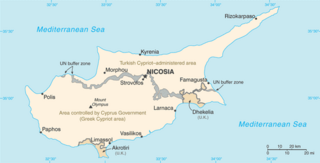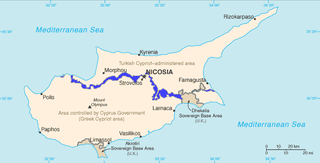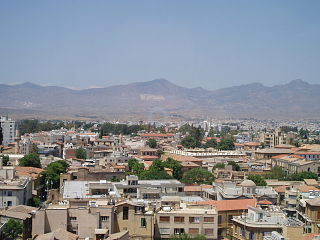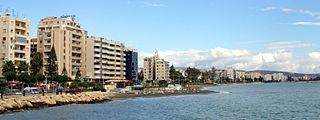
The Cyprus problem, also known as the Cyprus conflict, Cyprus issue, Cyprus dispute, or Cyprus question, is an ongoing dispute between the Greek Cypriot and the Turkish Cypriot community in the north of the island of Cyprus, where troops of the Republic of Turkey are deployed. This dispute is an example of a protracted social conflict. The Cyprus dispute stems from a Turkish military invasion of the island after a coup, and the presence of Turkish soldiers despite a legal reinstatement of a stable government. The desire of some of the ethnic Turkish peoples for the partition of the island of Cyprus through Taksim, and mainland Turkish nationalists settling in as a show of force as a supposed means of protecting their people from what they considered to be the threat of Greek Cypriots, also plays a role in the dispute.

United Nations Security Council resolution 526, adopted unanimously on 14 December 1982, noted a report of the secretary-general that, due to the existing circumstances, the presence of the United Nations Peacekeeping Force in Cyprus (UNFICYP) would continue to be essential for a peaceful settlement. The council expressed its desire for all parties to support the ten-point agreement for the resumption of intercommunal talks, and asked the Secretary-General to report back again before 31 May 1983 to follow the implementation of the resolution.

United Nations Security Council Resolution 646, adopted unanimously on December 14, 1989, noted a report of the Secretary-General that, due to the existing circumstances, the presence of the United Nations Peacekeeping Force in Cyprus (UNFICYP) would continue to be essential for a peaceful settlement. The Council expressed its desire for all parties to support the ten-point agreement for the resumption of intercommunal talks, and asked the Secretary-General to report back again before May 31, 1990, to follow the implementation of the resolution.

United Nations Security Council resolution 657, adopted unanimously on 15 June 1990, noted a report of the secretary-general that, due to the existing circumstances, the presence of the United Nations Peacekeeping Force in Cyprus (UNFICYP) would continue to be essential for a peaceful settlement. The council expressed its desire for all parties to support the ten-point agreement for the resumption of intercommunal talks, and asked the secretary-general to report back again before 30 November 1990, to follow the implementation of the resolution.

United Nations Security Council resolution 716, adopted unanimously on 11 October 1991, after noting a report of the Secretary-General, the Council recognised the progress made regarding the "Set of Ideas" in Cyprus and reaffirmed the efforts of the United Nations in solving the Cyprus dispute.

United Nations Security Council resolution 750, adopted unanimously on 10 April 1992, after reaffirming previous resolutions on the situation in Cyprus, the Council declared that the Cyprus dispute must be settled on the basis of a single Cyprus with a single sovereignty and citizenship, a bi-communal and bi-zonal federation, as set out in resolutions 649 (1990) and 716 (1991).

United Nations Security Council resolution 789, adopted unanimously on 25 November 1992, after reaffirming resolutions on Cyprus including 365 (1974), 367 (1975), 541 (1983), 550 (1984) and 774 (1992) and noting a report by the Secretary-General, the Council urged all concerned to implement a set of confidence-building measures.

United Nations Security Council resolution 902, adopted unanimously on 11 March 1994, after receiving a report from the Secretary-General Boutros Boutros-Ghali pursuant to Resolution 880 (1993), the council discussed confidence-building measures between the Republic of Cyprus and Northern Cyprus with the aim of resolving the Cyprus dispute.

United Nations Security Council resolution 939, adopted on 29 July 1994, after recalling all relevant resolutions on Cyprus, the Council discussed the implementation of confidence-building measures as part of a wider process to settle the Cyprus dispute.

United Nations Security Council resolution 969, adopted unanimously on 21 December 1994, after recalling resolutions 186 (1964), 831 (1993) and 889 (1993), the Council expressed concern at the lack of progress in the political dispute in Cyprus and extended the mandate of the United Nations Peacekeeping Force in Cyprus (UNFICYP) until 30 June 1995.

United Nations Security Council resolution 1000, adopted unanimously on 23 June 1995, after recalling all resolutions on Cyprus, particularly resolutions 186 (1964) and 969 (1994), the Council expressed concern at the lack of progress in the political dispute in Cyprus and extended the mandate of the United Nations Peacekeeping Force in Cyprus (UNFICYP) until 31 December 1995.

United Nations Security Council resolution 1032, adopted unanimously on 19 December 1995, after recalling all resolutions on Cyprus, particularly resolutions 186 (1964) and 1000 (1995), the Council expressed concern at the lack of progress in the political dispute in Cyprus and extended the mandate of the United Nations Peacekeeping Force in Cyprus (UNFICYP) until 30 June 1996.

United Nations Security Council resolution 1062, adopted unanimously on 28 June 1996, after recalling all resolutions on Cyprus, particularly resolutions 186 (1964), 939 (1994) and 1032 (1995), the Council expressed concern at the lack of progress in the political dispute in Cyprus and extended the mandate of the United Nations Peacekeeping Force in Cyprus (UNFICYP) until 31 December 1996.

United Nations Security Council resolution 1117, adopted unanimously on 27 June 1997, after recalling all resolutions on Cyprus, particularly resolutions 186 (1964), 939 (1994) and 1092 (1996), the Council extended the mandate of the United Nations Peacekeeping Force in Cyprus (UNFICYP) until 31 December 1997.

United Nations Security Council resolution 1146, adopted unanimously on 23 December 1997, after recalling all resolutions on Cyprus, particularly resolutions 186 (1964), 939 (1994) and 1117 (1997), the Council extended the mandate of the United Nations Peacekeeping Force in Cyprus (UNFICYP) for a further six months until 30 June 1998.

United Nations Security Council resolution 1179, adopted unanimously on 29 June 1998, after reaffirming all past resolutions on the situation in Cyprus, the Council discussed attempts to resolve the long-standing political dispute.

United Nations Security Council resolution 1251, adopted unanimously on 29 June 1999, after reaffirming all past resolutions on the situation in Cyprus, including resolutions 1217 (1998) and 1218 (1998), the Council extended the mandate of the United Nations Peacekeeping Force in Cyprus (UNFICYP) for a further six months until 15 December 1999.

United Nations Security Council Resolution 1930, adopted on June 15, 2010, after reaffirming all resolutions on the situation in Cyprus, particularly Resolution 1251 (1999), the Council extended the mandate of the United Nations Peacekeeping Force in Cyprus (UNFICYP) for a further six months until December 15, 2010 while negotiations towards a settlement of the dispute on the island were underway.

United Nations Security Council Resolution 1953, adopted on December 14, 2010, after reaffirming all resolutions on the situation in Cyprus, particularly Resolution 1251 (1999), the Council extended the mandate of the United Nations Peacekeeping Force in Cyprus (UNFICYP) for a further six months until June 15, 2011, calling for Greek and Turkish Cypriot leaders to develop a plan for overcoming differences before the Secretary-General visit in January 2011.

United Nations Security Council Resolution 1728, adopted unanimously on December 15, 2006, after reaffirming all resolutions on the situation in Cyprus, particularly Resolution 1251 (1999), the Council extended the mandate of the United Nations Peacekeeping Force in Cyprus (UNFICYP) for six months until June 15, 2007.















